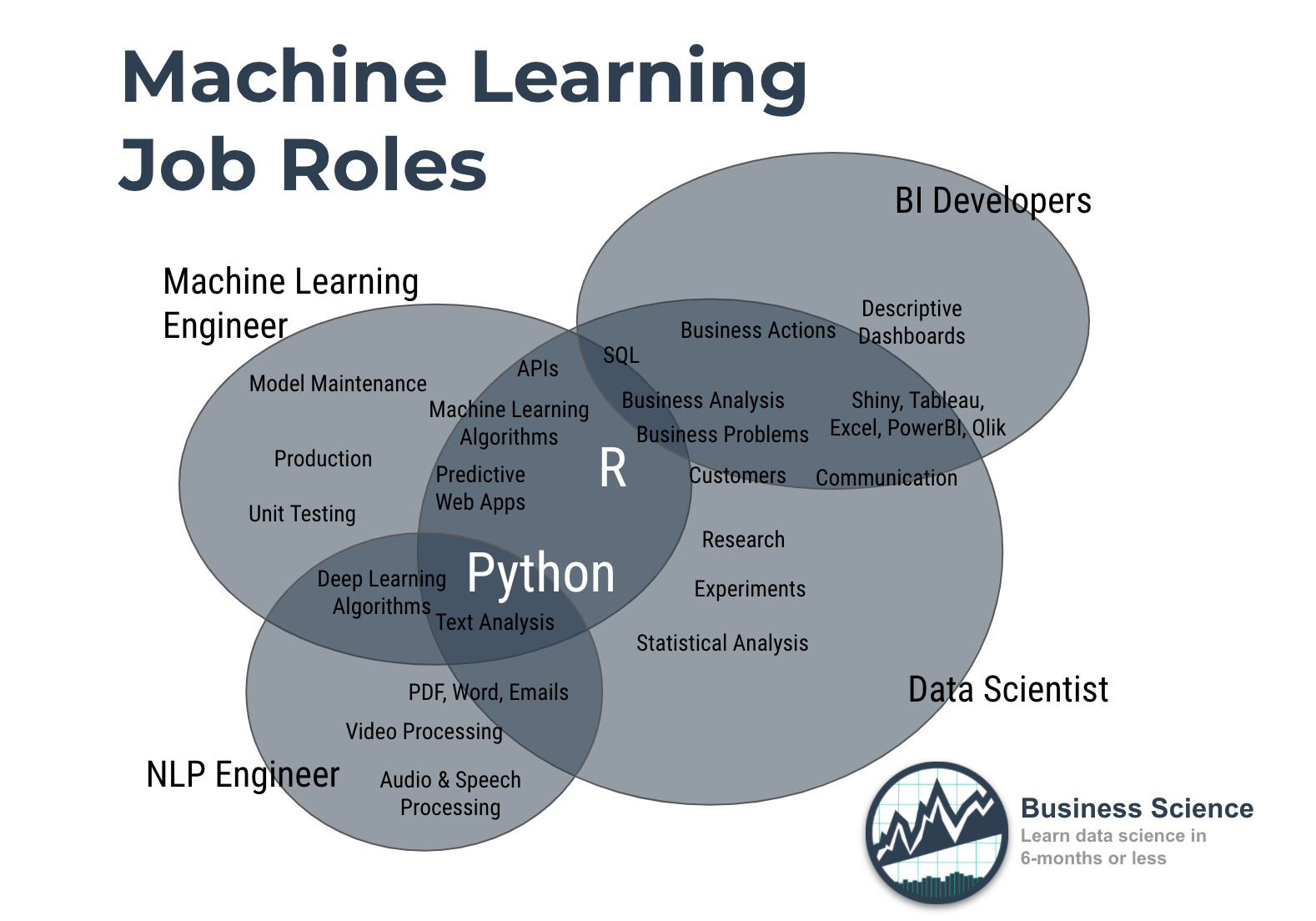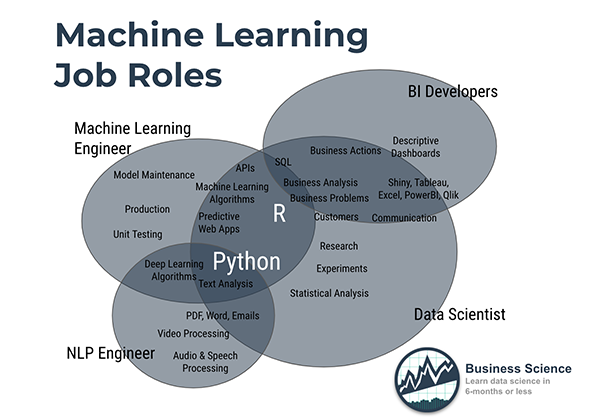What kind of job can you get if you master machine learning?
Written by Matt Dancho

Get In On A Growing Industry

Professionals from all around the world are becoming more and more interested in entering the field of machine learning. Using a Google trends report, you can clearly see how the interest for jobs in machine learning has increased over the past few years.

One reason interest in machine learning jobs will continue to grow is due to how lucrative the pay is. Another is how interesting the work is. If you’re looking to plant your foot in a growing industry, then machine learning could be for you. The average machine learning salary, according to Indeed’s research, can be anywhere between $96,00 - $146,085.
What kind of job can you get?
Machine learning is grounded in the goal of prediction, using known characteristics and traits of a given object or target, and finding patterns to help determine what comes next. Some of the job titles most often related to this framework are Data Scientists, Machine Learning Engineers, NLP Scientists, and Business Intelligence Developers.
Machine Learning Job Tasks and Project Roles

Data Scientists • Average Pay: $113,309
Data Scientists are the researchers when it comes to machine learning and rely heavily upon R and Python for business analysis, prediction, and decision making. Data Scientists are likely to have experience in many R packages and libraries, and actively use them in their roles, since their workload is likely to vary significantly from project to project. One day they might be working on parsing data from a very unstructured state into one more suitable for analysis. Another day they may rely on R’s robust visualization capabilities, or built in statistical testing options. From there, they may begin the initial stages of building machine learning predictive models in order to segment customer data. Next, they may be working on a forecasting project to prevent stock outages. The work is challenging and the business needs are changing.
Business Needs are changing
Businesses are seeking scalabile decision making. In the past reporting was preferred. Now it’s business apps that display predictive insights allowing teams in every part of the organization to become data-driven. This has given rise to the Full-Stack Data Scientist - A data scientist that knows both data science and web applications.
Data Scientist Roles are growing
While initially they began as primarily researchers, they are beginning to expand more into production-related tasks using tools such as R Shiny. Refer to this article on Shiny vs Tableau for Data Science.
Data Science Skills are changing
As tools are developing rapidly, it’s become increasingly important to know tools beyond just R and Python, which include Cloud Platforms like AWS and Azure, Software Development Tools such as Docker, and Code Version Control with Git.
Machine Learning Engineer • Average Pay: $146,085
Machine Learning Engineers use machine learning techniques, especially in R and Python, to develop and deploy systems that find insights beyond what human effort can typically accomplish. These are often individuals who studied data science more broadly, and later narrowed their focus into building advanced machine learning models and application development. For example, when it comes using basic machine learning models, most data scientists are able to evaluate various models for accuracy. However, machine learning engineers focus more on testing and logging various parameters in order to optimize these models for production deployment. Once a model is deployed into production, an ML engineer will be responsible for maintenance to ensure performance does not degrade over time as the data change.
Business Needs are changing
We are seeing a big push into development operations (DevOps) and machine learning. While machine learning is the title, the role is expanding into a new category that is called “MLOps”. This is because deploying and maintaining models and applications becomes a full-time job that has given rise to the Full-Stack Data Scientist.
NLP (Natural Language Processing) Scientist • Average Pay: $128,915
NLP (Natural Language Processing) Scientists are a specialized branch of data scientists who utilize R in order to analyze specifically raw textual data. The goal is often the same, as well as the background skills that a typical data scientist has, with the exception that an NLP scientist uses primarily raw text to build their machine learning predictive models. For example, NLP is often used to learn about customer interactions with sales departments. By combining text derived from emails and text generated from phone calls, companies can build their own dataset of successful versus unsuccessful sales interactions. This can allow for optimization of employee call center scripts to ensure successful outcomes become more likely.
Data Science Tools are changing
We are seeing an increase in Data Scientists learning NLP tools in R and Python. While the NLP engineer role may exist now, we expect Machine Learning and Data Science to consume NLP eventually.
Business Intelligence Developers focus • Average Salary: $130,000
Business Intelligence Developers focus on implementing machine learning techniques in R in order to maximize profits, gain new clients, and maintain their current clients. We can think of this job as being a balance of sales infused with data science and machine learning. While some of the other roles may focus more on the theoretical or statistical side of machine learning, in the Business Intelligence Developer role, oftentimes the goal is more related to actionable insights as opposed to statistical significance. For example, many times companies are looking to segment their customers into various groups for things like advertising campaigns. The successful sorting of the customers is the actionable insight that raises sales, whereas the mathematical and statistical curve fitting here isn’t needed to be as precise as it might be in working with medicinal development.
BI Tools are changing
We are seeing an increase in use of Shiny, Tableau, PowerBI, & Qlik. The advantage to shiny is that it natively runs R or Python (using reticulate), allowing for integration of predictive analytics. On the other hand, APIs are becoming more important as BI tools like Tableau can connect to and make requests from APIs. Machine Learning APIs can be built with R and Python using the Full Stack Data Science skills:
How can I work towards getting a job in machine learning?
Contrary to what most people think, you don’t need a fancy degree or work history to get a job in machine learning. To master machine learning and land a job, you’re going to need to gain real experience. When looking to either change or advance your current career, upskilling and demonstrating this mastery is key to your success. You can gain these skills and more to help advanced your career by checking out our R courses by visiting https://university.business-science.io/p/5-course-bundle-machine-learning-web-apps-time-series.
GET STARTED
Success Stories From Our Students
The courses have an astonishing summarization of technologies, languages and approaches, all wrapped up and made as easy as possible. I was able to use the data science education to to build my own Shiny Apps portal as a portfolio. That was the key that helped me land a national research team position.
-Hernán
Masatake learned how to create business-value using data science skills, which helped him land a data science role at a leading consulting firm.
Stephen says the course accommodates different learning styles and the instructor support helped him apply skills to his day-to-day work.
Rodrigo is able to deliver data science consulting projects in half the time it used to take.